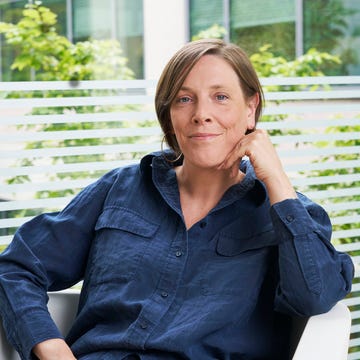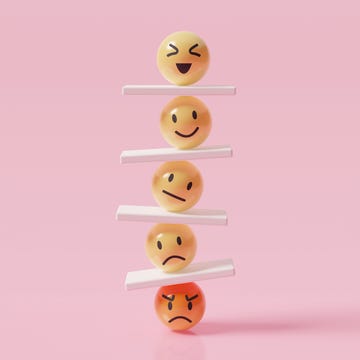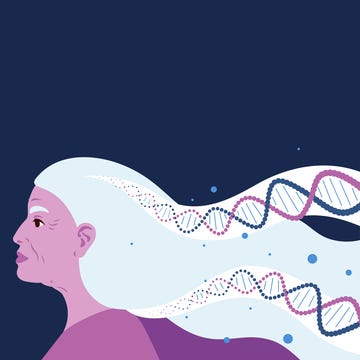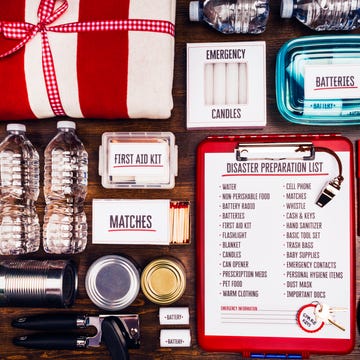The latest figures show that the national birth rate has fallen to a new low - the lowest, in fact, since records began, with just 1.44 children per woman in England and Wales. As a result, maternity services are under threat, and in London, the closure of the Royal Free Hospital's maternity unit has been announced.
So what's behind the falling birth rates - and what are the experiences of new mothers today, compared to the 1970s and 1980s? That's what we set out to understand in the landmark GH Motherhood survey.
Did mothers have it easier in the 1970s and 1980s? Were we better prepared for the challenges of the early weeks of motherhood in previous decades? We wanted to understand more about mothering experiences for every generation, and that’s why we asked GH readers to share their journeys.
The results made for fascinating reading. Nearly 1,400 women from every generation responded; the oldest was 97, the youngest, 23. We asked questions around all aspects of new motherhood, including whether or there was access to help, support and information; we also wanted to explore the impact of having a baby on a new mother's emotional state. And we wanted to find out: are we open enough about what motherhood means?
What you told us
While the inner world of a young baby is well-mapped by an army of psychotherapists and paediatricians, the inner world of a new mum is much less explored. Quite simply, respondents told us, nothing can prepare you for what becoming a mother means – and this holds true whether you became a parent in the 1970s or 2020s.
‘My whole life changed,’ said one 35-year-old. ‘I was now responsible for a tiny human who would need me for their whole life. I’ve never felt love like it.’ Another 56-year-old mother of two said: ‘You can never tell anyone how it changes your life - good, and bad.’
Generally, the more recent the birth, the less likely mothers were to have the birth experience they’d hoped for; in fact, fifty percent of women who gave birth in the past four years said they didn’t have the experience they’d hoped for. This compares to 78% of women who gave birth 41-50 years ago and had an experience they were happy with.
‘It was so different then,’ says one respondent, aged 67. ‘There was a lot of support. There was also a baby bounty pack that was given to you in hospital with lots of different samples and helpful information. We took our babies to the clinic, where there was a health visitor and doctor available.’
‘When I had my first child in 1984, I gave birth in the nearest main hospital. When your baby was one day old, they transferred you to a cottage hospital,’ says another, aged 72. ‘You stayed there for two weeks whilst the local midwifery team looked after you.’
‘In 1979, mothers stayed in hospital for a week,’ says another, 74. ‘There was a lesson each day - bathing the baby, preparing a bottle, nappy changing.’
But it's a very different story for more recent births, and some mothers told of traumatic experiences. ‘I had my first daughter in 2023 and the experience was something I never wanted to experience again,’ one 27-year-old mother said. ‘I did not expect it to be so traumatic, as no one talks about it,’ another 37-year-old said.
Conflicting emotions
It’s clear that becoming a mother for the first time carries with it many conflicting emotions. While the most abiding memory of survey respondents was that of a joyful time bonding with the baby, 35% said they felt totally overwhelmed by the experience, and nearly one in three struggled to breastfeed and felt like a failure. For 36% of respondents, there was a loss of sense of self – but a gain in new insights.
‘Nothing really prepares you for having a child and each child is totally different,’ one respondent, 58, told us. ‘I had no expectations of how a mother should act or how it all worked, so I had a great experience of discovery. I found I wasn’t that bad at the mothering stuff. It surprised me as much as it did my partner and my family.’
‘First-time motherhood is like a voyage into the unknown!’ said another, 45. ‘Mistakes are made but, gradually, confidence develops through experience.’ According to another: ‘It was a complete blur and struggle as a first-time young mother. A miracle we all survived!’
A miracle indeed… a huge 39% of all respondents said they felt completely exhausted, with an expectation that they had to do everything. While almost one in three (31%) believed they had plenty of support, the same number of new mothers said they felt under pressure to be perfect, and 29% felt a loss of identity – becoming a mother, they told us, was all-consuming. The post war baby-boomer generation was the most likely to have a positive experience of motherhood, with three quarters reporting they didn’t feel any pressure to be perfect, and just one in five feeling isolated.
Postnatal depression
It’s unsurprising that becoming a mother can trigger difficult emotions – and this holds true across the generations. Contrary to the NHS figures, almost one in three respondents told us they experienced postnatal depression (PND).
An additional one in five (22%) said they’d felt low at times in the early days of motherhood. Even in 2024, with the laser focus on mental health, new mothers find themselves cast out of the spotlight – of the survey respondents who’d suffered from PND, one in six tried to cover it up, as they didn’t want anyone to know.
‘I discovered I had postnatal depression when my child was six months old and I was very relieved – I had a reason at long last for why I felt so different to the other new mums around me,’ said one respondent, 45. Another, 32, told us: ‘It felt exhausting and I had really bad baby blues a week after birth. Just generally felt overwhelmed and even though I had support I felt alone.’ According to a third, aged 30: ‘It was very scary. I found it hard because I didn’t really have anyone to help me.’
There’s little doubt that loneliness contributes to depression for new mothers. In fact, studies show that new mums today sometimes spend up to eight hours a day alone with their baby, and 43% feel lonely the majority of the time.
Dr Katherine Adlington, a psychiatrist who’s researched the role loneliness plays in women diagnosed with postnatal depression, says: ‘Loneliness was central to the experiences of women with postpartum depression. Stigma seemed to be a major factor – women talked about feeling ashamed that they were depressed, that there was an expectation of this being the happiest time of their life. Dislocation from previous lives and identity could also feel very alienating – so loss of work, financial independence and social networks.’
For new mothers struggling with overwhelm, we asked what would have made the early months of motherhood more manageable. Women of every generation say getting more sleep is the one thing that’d have made a real difference to their enjoyment of early motherhood. More confidence in mothering skills, said 39%; and being kinder to yourself (33%). For one in three new mothers, an easier breastfeeding journey would have helped. Women who became mothers in the last four years are most likely to feel supported by your partner, with 46% saying they share the baby care, compared to just one in five mothers who gave birth 50-60 years ago.
Our survey results do suggest that the more recently you gave birth, the more unsettling, difficult and disruptive the transition to motherhood. ‘There are so many factors that might explain why more recent birth experiences appear to be more difficult,’ says Amy Tubb of maternalmentalhealthalliance.org. ‘These include increasingly overstretched maternity and health visiting services, shrinking support networks due to dispersed families and friends, comparison culture, and societal structures failing to adapt to the competing demands of work and family life.’ And perhaps these factors feed into the falling birthrate, too.
Despite the many challenges of new motherhood, there is also, for many mothers, a sense of deep joy and love, and renewed closeness with their partner. What was striking was the range of experiences you told us about, spanning generations of women. For every mother who was surrounded by support and a helpful partner, there was one who felt scared and alone. Some mothers struggled with depression, while others experienced a happy infancy.
But whatever our age, whenever we gave birth, we can only help future generations of mothers-to-be by being honest about our shared experiences. ‘The answer isn’t for new and expectant mothers to lower their expectations but for society to recognise these mounting pressures and push for compassionate change,’ says Amy Tubb. ‘Every new mother deserves the care and support she needs to thrive.’ And it’s only by starting a new conversation around motherhood, involving the voices and experiences of every generation of women, that will mean we can finally put to bed expectations that new mothers should just ‘enjoy every minute’.














